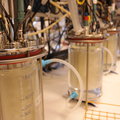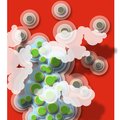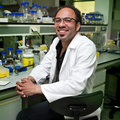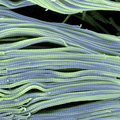Archive
07 May 2020
TU Delft leads new European project on membrane-less redox flow batteries
The EU recently awarded €4Million to the MELODY consortium, to develop low cost, innovative batteries for large-scale energy storage, as part of the Horizon 2020 program ‘Advanced Redox Flow Batteries for stationary energy storage’. The MELODY consortium consists of small & medium enterprises (Elestor, PV3 Technologies, Vertech), industry (Shell) and academic leaders (TU Delft, Technion, University of Exeter, ETH Zurich), with coordination support provided by Hezelburcht. The collaborative project began in January 2020, and will run for 4 years, leading to a pilot facility that demonstrates the practical application, with each partner bringing required know-how and capabilities to complete the project.
30 April 2020
Investment of 14 million for better use of micro-organisms

27 April 2020
TU Delft researchers gain new insights into Vermeer’s Girl with a Pearl Earring

Scientific research into the world-famous painting by Johannes Vermeer, known as the 'Girl with a Pearl Earring', has yielded new insights. TU Delft researchers played an important role in making discoveries about the brushwork, the use of pigments and how Vermeer built up his painting with various layers of paint.
23 April 2020
Andreas Wallucks selected as Schmidt Science Fellow

Schmidt Futures has selected Andreas Wallucks of the Simon Groeblacher Lab (Quantum Nanoscience) as one of their 22 early-career interdisciplinary Fellows. Wallucks will receive a a $100,000 stipend that allows him to change topics as a postdoc. He will join a community of fellows and will be paired with an internationally accomplished and experienced senior scientist as a mentor.
20 April 2020
Microorganisms work together to survive high temperatures

Delft researchers demonstrate that microorganisms can work together and help each other and their future generations survive and replicate at high temperatures.
17 April 2020
European Commission greenlights large international water project

The European Commission has signed the grant agreement for WATER MINING, a 17 million euro project aimed at demonstrating innovative water resource solutions. As part of the project, demonstrations in Cyprus, Spain, Portugal, Italy and The Netherlands will be built to show novel efficient ways to reclaim nutrients, minerals, energy and water from industrial and urban wastewater and seawater. The public-private consortium consists of 38 public and private partners and 4 linked third parties in 12 countries. It will be led by Delft University of Technology (TU Delft).
17 April 2020
Bertus Beaumont: "I believe in the power of a more personal approach to education"

"I memorize all the names of my students and speak to them during the lecture. Yes, even the names of the eighty students who take my bachelor's course!" laughs Bertus Beaumont. He specialises in evolutionary biology and teaches three subjects on behalf of BN/Bionanoscience. "I am committed to renewing education with a personal and multidisciplinary approach." This interview is part of a series of articles on innovation in education and was conducted before the start of the corona crisis.
09 April 2020
Researchers create tiny self-powered temperature sensors
A team of researchers from the University of Oxford, Delft University and IBM Zurich have demonstrated that graphene can be used to build sensitive and self-powering temperature sensors. The findings pave the way for the design of highly sensitive thermocouples, which could be integrated in nanodevices and even living cells.
09 April 2020
Anton Akhmerov: "Teaching online is the way to go"
All the material that 'quantum tinker' Anthon Akhmerov treats in his lectures can be found on a website he set up. Like the bachelor's course Solid State Physics, which he gives to about 200 students each year." Since everything was already online, teaching at a distance during the corona crisis is relatively easy for me to do."
02 April 2020
The strength of collagen

Collagen is the glue that holds our bodies together. It can be found in our skin, bones, muscles, cartilage, ligaments, hair, nails - in short, in almost every tissue in our body. In some places, for example in the skin, collagen proteins form networks that are very elastic. But why these networks are so elastic has so far been unclear. Researchers from Delft University of Technology, AMOLF and Wageningen University & Research have now discovered that the number of 'intersections' plays an important role. Between three and four connections per intersection is ideal. In fact, more connections makes the collagen networks less elastic. The new insights can be used, among other things, to repair damaged or aged tissue, such as cartilage or skin, and to grow new skin tissue for burn victims.